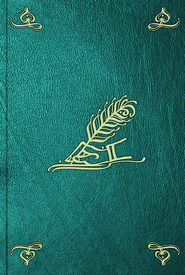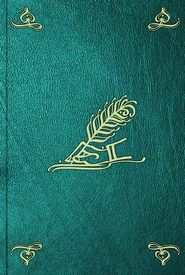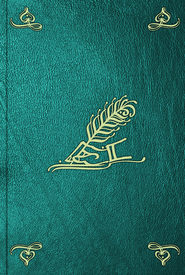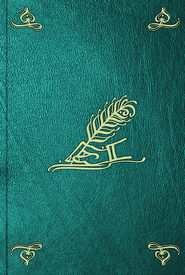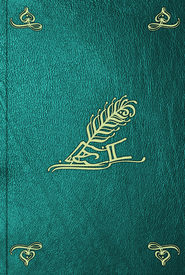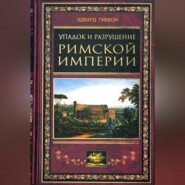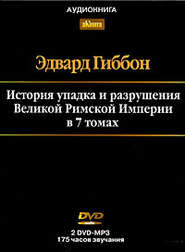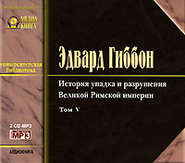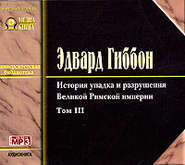По всем вопросам обращайтесь на: info@litportal.ru
(©) 2003-2025.
✖
Private Letters of Edward Gibbon (1753-1794) Volume 1 (of 2)
Настройки чтения
Размер шрифта
Высота строк
Поля
Footnote_159_159
Afterwards the third Lord Coleraine.
Footnote_160_160
Lord Archibald Hamilton, M.P. for Lancashire, accepted the stewardship of the Manor of East Hendred, January, 1772. Sir T. Egerton was elected in his place.
Footnote_161_161
An allusion to the Welsh opinion that Sir Watkin Williams Wynn was as great a person. On the death of Sir John Astley, M.P. for Shropshire, Sir Watkin was elected.
Footnote_162_162
Maria Theresa did not die till November, 1780.
Footnote_163_163
i. e. The Princess of Wales.
Footnote_164_164
Her eldest child, Augusta (1737-1813), married, in 1764, the Duke of Brunswick-Wolfenbüttel.
Footnote_165_165
Henrietta Vernon, married to Lord Grosvenor in July, 1764, was seduced by the Duke of Cumberland. Lord Grosvenor brought an action against the duke for criminal conversation, July 5, 1770, and recovered damages in the sum of £10,000. Lady Grosvenor, who was separated, not divorced, married, in 1802, General Porter, M.P. for Stockbridge.
Footnote_166_166
Lord Apsley.
Footnote_167_167
Lord Chesterfield died March 24, 1773.
Footnote_168_168
Fox only retired from the Government on the Royal Marriage question. In January, 1773, he resumed office as one of the Lords of the Treasury.
Footnote_169_169
Afterwards Lord Sydney. Dr. Nowell's sermon, which, it was alleged, inculcated passive obedience, was preached January 30, 1772, at St. Margaret's, Westminster. The vote of thanks was voted January 31, and the sermon printed by desire of the House. On February 21 it was moved that, for the future, the thanks of the House should not be voted till the sermon was printed and delivered. The motion here attributed to Townshend was an expression of his opinion, given in the course of the debate. Lord North evaded the motion by moving the order of the day. On February 25 a motion was proposed and carried to expunge the entry of the vote of thanks.
Footnote_170_170
Sir R. Worsley succeeded to the baronetcy on the death, in 1768, of Sir Thomas Worsley. He was M.P. for Newport, Isle of Wight, 1774-84, and for Newtown, Isle of Wight, 1790-1802. He was sworn a privy councillor, and made Governor of the Island in January, 1780. He was also Comptroller of the Royal Household. He published his History of the Isle of Wight in 1781. In 1782, on the accession to office of the Rockingham administration, he was deprived of the Governorship of the Island in favour of the Duke of Bolton. As Diplomatic Resident at Venice, he made the collections and sketches which are reproduced in the Museum Worsleyanum (2 vols., 1794-1803). He died in 1805. His only son predeceased him. His estates passed, through his only sister, Henrietta Frances (married to John Bridgman-Simpson, Esq.), to her only child, Henrietta, who married the Earl of Yarborough.
Footnote_171_171
This letter affords a curious, though extreme, instance of Lord Sheffield's editorial methods. The letter numbered XXXII. in Lord Sheffield's edition of "Letters to and from Edward Gibbon, Esq." (1814), is dated October 13, 1772. It begins with the first four lines of this letter, which was written on April 21, 1772. The next nine lines are taken from the commencement of the letter written on October 3, 1772. The five following lines consist of the letter written on November 3, 1772. The next four lines are taken from the letter dated October 30, 1772. The two following lines are from the letter written on October 15, 1772. Thus what purports to be a real letter in itself, proves to be a patchwork composed from five letters extending over a period of six months.
Footnote_172_172
May 27, 1772. – "This afternoon three ships belonging to his Britannic Majesty cast anchor in the road of Elsineur. They are to convoy her Danish Majesty to Stade in her way to Zell" (Annual Register).
Footnote_173_173
Probably Mr. Benjamin Way, the brother of Lady Sheffield. His wife was a daughter of Dr. Cooke, Provost of King's College, Cambridge.
Footnote_174_174
In Poland, desultory hostilities had been carried on for several years between the Roman Catholics, favoured by France, and the Dissidents (i. e. those embracing any other form of Christian faith), supported by Russia. Taking advantage of the anarchy which King Stanislaus Poniatowski was powerless to control, Frederick the Great, the Empress Catherine, and the Emperor Joseph II. proposed to occupy those provinces which were respectively most contiguous to their own dominions. The result was the partition of Poland, August, 1772. Field-Marshal Laudohn (1716-1790) is said to have been of Scottish origin. During the Seven Years' War he had proved himself, at the head of the Austrian forces, a formidable antagonist to Frederick the Great.
Footnote_175_175
John William Holroyd, at that time the only son of Mr. Holroyd.
Footnote_176_176
Eldest son of Sir Matthew Featherstonhaugh, and his successor in the baronetcy.
Footnote_177_177
Sir John Rous, M.P. for Suffolk, died October 31, 1771, and from his widow Gibbon took 7 Bentinck Street, where he lived till September, 1783.
Footnote_178_178
William Jolliffe, M.P. for Petersfield, Commissioner of Trade and Plantations.
Footnote_179_179
Parliament adjourned from December 23, 1772, to January 22, 1773.
Footnote_180_180
An allusion to Lord North's habit of sleeping in the House of Commons. He slumbered, as Gibbon says in his Autobiography, between the Attorney-General (Thurlow) and the Solicitor-General (Wedderburn), who roused him when it was necessary that he should speak. On one occasion a member of the Opposition exclaimed, in reproach of his somnolence, "Even now the noble lord is slumbering over the ruin of his country!" "I wish to Heaven," muttered Lord North, slowly opening his eyes, "that I was!"
Footnote_181_181
Her daughter, Sophia Matilda (1773-1844), was born May 29, 1773.
Footnote_182_182
See note to Letter 204.
Footnote_183_183
The duel in question was fought between Lord Bellamont and Lord Townshend. The cause, according to the London Evening Post, was the offence taken by Lord Bellamont at the abrupt refusal of Lord Townshend, then Viceroy of Ireland, to see him at Dublin. As soon as Lord Townshend arrived in England, Lord Bellamont sent him a message that he would be glad if the affair could be "settled à la militaire." The duel took place February 2nd, in the Mary-le-bone Fields, when Lord Bellamont received a shot near the groin, and then fired his pistol in the air. Lord Ligonier was Lord Townshend's second, and Mr. Dillon acted for Lord Bellamont.
Afterwards the third Lord Coleraine.
Footnote_160_160
Lord Archibald Hamilton, M.P. for Lancashire, accepted the stewardship of the Manor of East Hendred, January, 1772. Sir T. Egerton was elected in his place.
Footnote_161_161
An allusion to the Welsh opinion that Sir Watkin Williams Wynn was as great a person. On the death of Sir John Astley, M.P. for Shropshire, Sir Watkin was elected.
Footnote_162_162
Maria Theresa did not die till November, 1780.
Footnote_163_163
i. e. The Princess of Wales.
Footnote_164_164
Her eldest child, Augusta (1737-1813), married, in 1764, the Duke of Brunswick-Wolfenbüttel.
Footnote_165_165
Henrietta Vernon, married to Lord Grosvenor in July, 1764, was seduced by the Duke of Cumberland. Lord Grosvenor brought an action against the duke for criminal conversation, July 5, 1770, and recovered damages in the sum of £10,000. Lady Grosvenor, who was separated, not divorced, married, in 1802, General Porter, M.P. for Stockbridge.
Footnote_166_166
Lord Apsley.
Footnote_167_167
Lord Chesterfield died March 24, 1773.
Footnote_168_168
Fox only retired from the Government on the Royal Marriage question. In January, 1773, he resumed office as one of the Lords of the Treasury.
Footnote_169_169
Afterwards Lord Sydney. Dr. Nowell's sermon, which, it was alleged, inculcated passive obedience, was preached January 30, 1772, at St. Margaret's, Westminster. The vote of thanks was voted January 31, and the sermon printed by desire of the House. On February 21 it was moved that, for the future, the thanks of the House should not be voted till the sermon was printed and delivered. The motion here attributed to Townshend was an expression of his opinion, given in the course of the debate. Lord North evaded the motion by moving the order of the day. On February 25 a motion was proposed and carried to expunge the entry of the vote of thanks.
Footnote_170_170
Sir R. Worsley succeeded to the baronetcy on the death, in 1768, of Sir Thomas Worsley. He was M.P. for Newport, Isle of Wight, 1774-84, and for Newtown, Isle of Wight, 1790-1802. He was sworn a privy councillor, and made Governor of the Island in January, 1780. He was also Comptroller of the Royal Household. He published his History of the Isle of Wight in 1781. In 1782, on the accession to office of the Rockingham administration, he was deprived of the Governorship of the Island in favour of the Duke of Bolton. As Diplomatic Resident at Venice, he made the collections and sketches which are reproduced in the Museum Worsleyanum (2 vols., 1794-1803). He died in 1805. His only son predeceased him. His estates passed, through his only sister, Henrietta Frances (married to John Bridgman-Simpson, Esq.), to her only child, Henrietta, who married the Earl of Yarborough.
Footnote_171_171
This letter affords a curious, though extreme, instance of Lord Sheffield's editorial methods. The letter numbered XXXII. in Lord Sheffield's edition of "Letters to and from Edward Gibbon, Esq." (1814), is dated October 13, 1772. It begins with the first four lines of this letter, which was written on April 21, 1772. The next nine lines are taken from the commencement of the letter written on October 3, 1772. The five following lines consist of the letter written on November 3, 1772. The next four lines are taken from the letter dated October 30, 1772. The two following lines are from the letter written on October 15, 1772. Thus what purports to be a real letter in itself, proves to be a patchwork composed from five letters extending over a period of six months.
Footnote_172_172
May 27, 1772. – "This afternoon three ships belonging to his Britannic Majesty cast anchor in the road of Elsineur. They are to convoy her Danish Majesty to Stade in her way to Zell" (Annual Register).
Footnote_173_173
Probably Mr. Benjamin Way, the brother of Lady Sheffield. His wife was a daughter of Dr. Cooke, Provost of King's College, Cambridge.
Footnote_174_174
In Poland, desultory hostilities had been carried on for several years between the Roman Catholics, favoured by France, and the Dissidents (i. e. those embracing any other form of Christian faith), supported by Russia. Taking advantage of the anarchy which King Stanislaus Poniatowski was powerless to control, Frederick the Great, the Empress Catherine, and the Emperor Joseph II. proposed to occupy those provinces which were respectively most contiguous to their own dominions. The result was the partition of Poland, August, 1772. Field-Marshal Laudohn (1716-1790) is said to have been of Scottish origin. During the Seven Years' War he had proved himself, at the head of the Austrian forces, a formidable antagonist to Frederick the Great.
Footnote_175_175
John William Holroyd, at that time the only son of Mr. Holroyd.
Footnote_176_176
Eldest son of Sir Matthew Featherstonhaugh, and his successor in the baronetcy.
Footnote_177_177
Sir John Rous, M.P. for Suffolk, died October 31, 1771, and from his widow Gibbon took 7 Bentinck Street, where he lived till September, 1783.
Footnote_178_178
William Jolliffe, M.P. for Petersfield, Commissioner of Trade and Plantations.
Footnote_179_179
Parliament adjourned from December 23, 1772, to January 22, 1773.
Footnote_180_180
An allusion to Lord North's habit of sleeping in the House of Commons. He slumbered, as Gibbon says in his Autobiography, between the Attorney-General (Thurlow) and the Solicitor-General (Wedderburn), who roused him when it was necessary that he should speak. On one occasion a member of the Opposition exclaimed, in reproach of his somnolence, "Even now the noble lord is slumbering over the ruin of his country!" "I wish to Heaven," muttered Lord North, slowly opening his eyes, "that I was!"
Footnote_181_181
Her daughter, Sophia Matilda (1773-1844), was born May 29, 1773.
Footnote_182_182
See note to Letter 204.
Footnote_183_183
The duel in question was fought between Lord Bellamont and Lord Townshend. The cause, according to the London Evening Post, was the offence taken by Lord Bellamont at the abrupt refusal of Lord Townshend, then Viceroy of Ireland, to see him at Dublin. As soon as Lord Townshend arrived in England, Lord Bellamont sent him a message that he would be glad if the affair could be "settled à la militaire." The duel took place February 2nd, in the Mary-le-bone Fields, when Lord Bellamont received a shot near the groin, and then fired his pistol in the air. Lord Ligonier was Lord Townshend's second, and Mr. Dillon acted for Lord Bellamont.







